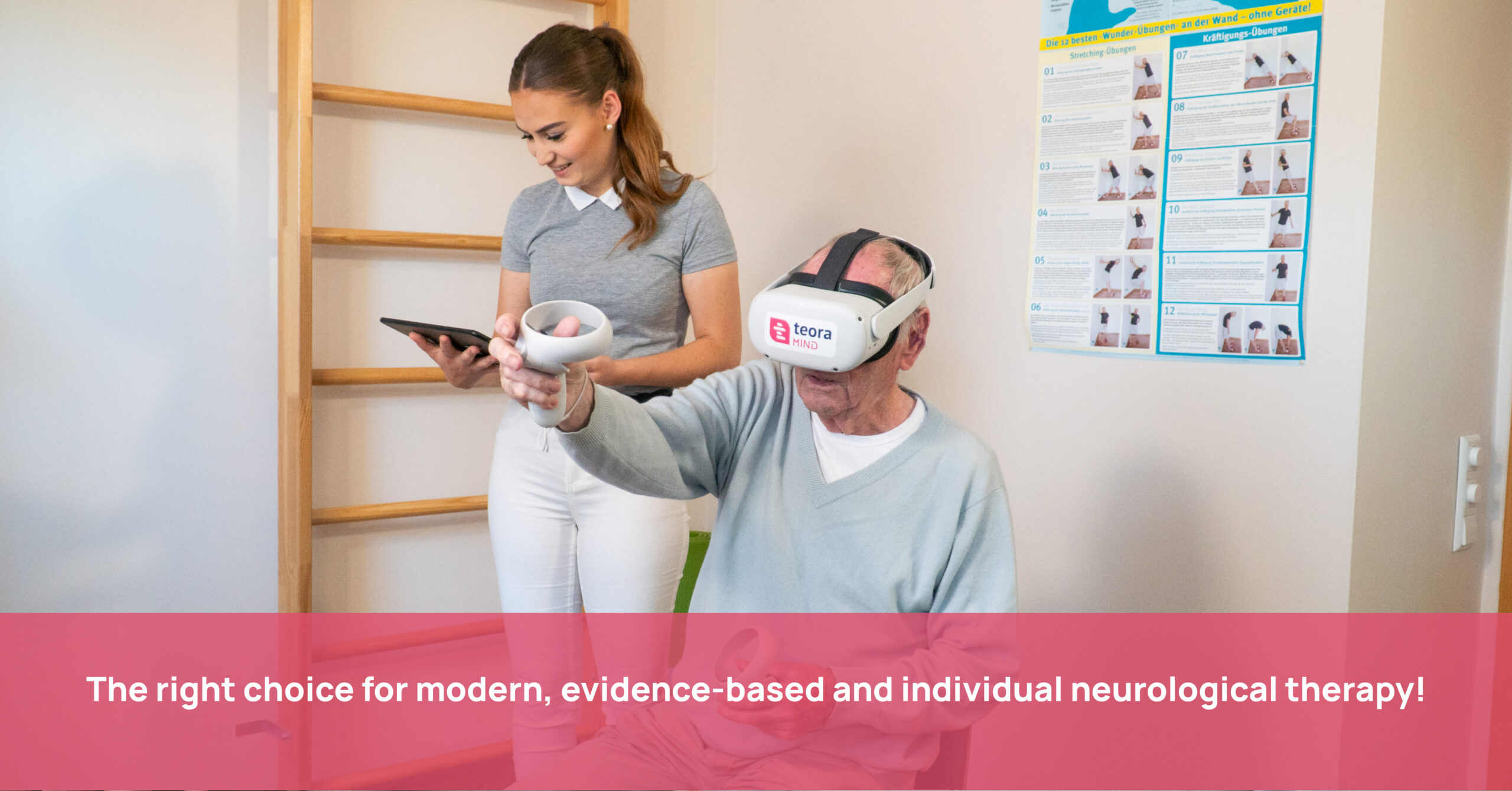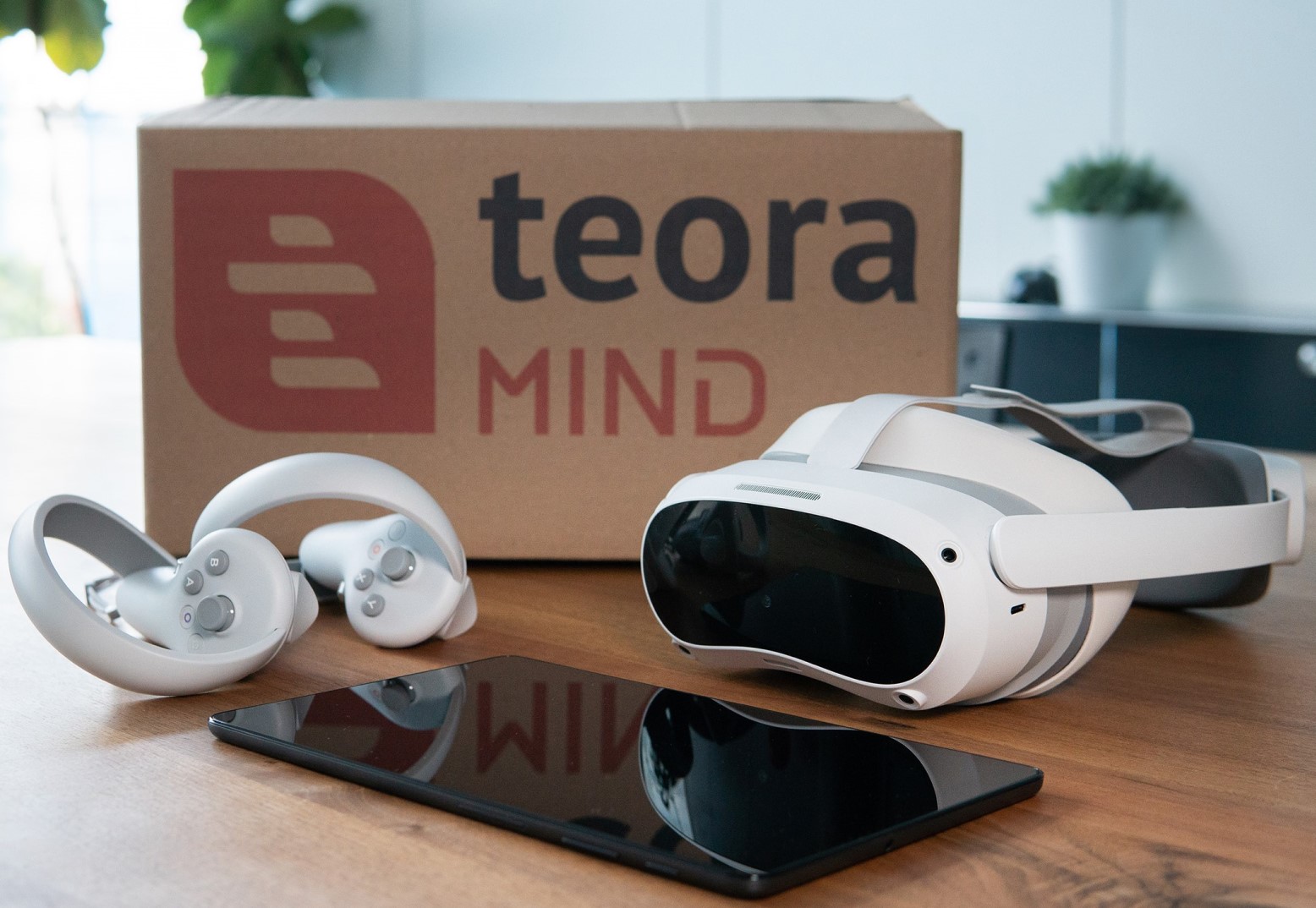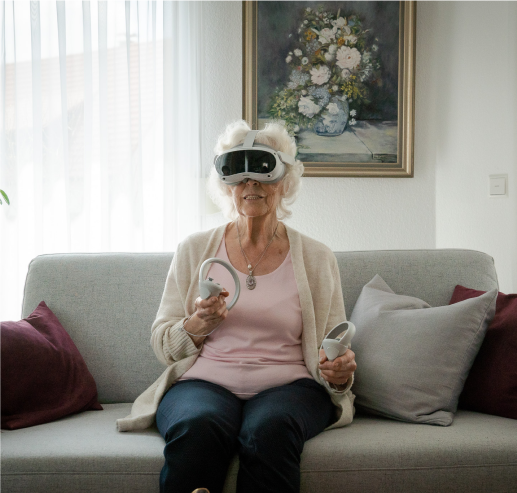
Everyday-based cognitive training with teora mind
Our medical device teora mind is the first of its kind that is approved in the EU in accordance with the MDR and can be used to treat cognitive deficits in neurotherapy. It is a therapy software that uses virtual reality to simulate everyday life in a playful and tangible way. The focus is on activities of daily living (ADL). In different scenarios, for example, coffee making, organizing the refrigerator or gardening can be trained. This gives those affected the opportunity to complete brain performance training based on everyday situations that they encounter on a daily basis.
Kitchen
Train your patients‘ attention, concentration and memory in our kitchen with various exercises that are close to everyday life:
- Make coffee
- Preparation of fruit salad
- Filling the fridge
- Sorting food
Garden
In our garden you will train your patients‘ executive functions. At the beginning, a plan of action is drawn up, which specifies the order in which a plant is, for example, planted, watered, fertilized and harvested. This planning is then implemented.
The number of planning steps varies according to the selected severity level.
Beach
In addition to training memory and action planning, your patients will practice handling money while selling ice cream, cold drinks or milkshakes in our beach shack. There they learn how to implement multi-stage orders correctly.
Relaxation room
After a busy day, your patients can find peace in calming environments such as the rocky coast of Lanzarote or the waterfalls in Iceland in our relaxation room.
Evidence-based cognitive training with teora mind
As a manufacturer of medical products, the scientific basis of our products is particularly important to us. For this reason, we have already conducted two studies.
In the user experience study, we investigated how stroke patients react to teora mind. The study showed that treatment with teora mind is well accepted by older adults and stroke patients regardless of previous contact with VR.
In addition, the effectiveness of teora mind was evaluated in a clinical study in comparison to the usual standard therapy consisting of computer-based training. The group of stroke patients treated with teora mind achieved better results than the control group. The most significant improvements were seen in the areas of planning and problem solving. The results indicate that therapy with teora mind is a safe and effective treatment.
Indications for teora mind
teora mind is used for people who are significantly restricted in their independence, self-determination or daily living skills due to cognitive deficits. These cognitive impairments are associated with diseases that affect the nervous system. This could be, for example strokes, Parkinson’s disease, mild cognitive impairment or traumatic brain injury.
If you would like to use teora mind beyond the areas of application defined by us, please contact us.

Components of the teora mind system
The teora mind therapy software is supplied together with the required hardware. The overall system comprises the following components:
- Mobile VR glasses (model: Meta Quest 2) incl. two controls. However, all exercises can also be performed with one hand.
- A therapy tablet (model: Samsung Galaxy Tab A) that therapists can use to monitor their patients‘ training success in real time and adapt the therapy plan accordingly.
- Access to the accompanying teora platform web app
The hardware is already prepared so that it only needs to be switched on before training begins. No additional technical equipment is required. All you need is a stable and password-protected wireless network.
Digital therapy support with teora platform
The teora platform web application included in the teora mind system enables you to accompany your patients beyond the therapy room. You can compile special exercises from teora mind into personalized therapy plans, evaluate training successes and make possible adjustments to the plan. It goes without saying that teora platform complies with the applicable data protection regulations.
teora mind In aftercare
The combined use of mobile VR glasses and the accompanying teora platform web application enables you to extend your therapy services from the practice to the living room at home. Your patients can take the VR glasses home with them and train independently of physical visits to the practice, while you accompany their personal therapy progress virtually. This means that the necessary intensity of therapy can be guaranteed even when your practice is busy.
Your reasons for teora mind
Your benefits as an occupational therapist
- Application of evidence-based therapy
- Everyday cognitive training of activities that are difficult to repeat, potentially dangerous, overwhelming or difficult to control under real-life conditions.
- Increased readiness for therapy and more motivated patients due to the playful character
- More efficient utilization of your staff thanks to the option of treating several patients in parallel
- Simple monitoring and documentation of the course of therapy reduce your manual documentation effort
- Therapy possibility independent of location


The advantages for your patients
- Targeted training for life’s problems
- Simple and user-friendly application
- Increased frequency of therapy
- Increased motivation through gamified content
- Greater opportunities to integrate therapy into the usual daily routine
More information
In ourbrochure you will find all the information you need at a glance. You are welcome to pass these on to your patients.
FAQ
Why does it make sense to use virtual reality for cognitive training?
Virtual reality offers several advantages for rehabilitation. First, it is possible to train potentially dangerous situations over and over again without actual danger. On the other hand, many activities in everyday life are difficult to train several times in a row, whereas this is easier in virtual reality.
Furthermore, virtual reality is location-independent due to mobile technical devices. Numerous scientific publications suggest the use of virtual reality for therapy and treatment of various diseases. If you would like to find out more about this scientific basis, please read here continue.
Does virtual reality therapy have side effects?
Some people report mild nausea, mild headaches or mild dizziness the first few times they use virtual reality. These symptoms are also called motion sickness. They sometimes occur when the vestibular organ and the eyes report two different signals to the brain. For example, the balance system "says" "We are not moving - we are sitting" and the eyes report "We are riding a roller coaster and moving forward very fast." This conflict between the eyes and the organ of balance can cause "confusion" in the brain and lead to nausea, dizziness or headaches.
However, we take care in each of our applications not to create conflicting signals between the eyes and the vestibular organ, so as to minimize the risk of motion sickness as much as possible.
For more detailed information on side effects, please read the VR headset manufacturer's health and safety warnings here for more information.
Is teora mind reimbursable?
teora mind has been reimbursable for fully insured persons of the INTER Insurance Group since 01.02.2024.
If you or your patient is insured with another provider, please contact the relevant health insurance company for more information
In addition, we are working on a pilot project with the German Pension Insurance to become eligible for reimbursement in rehabilitation and aftercare.
How much does the teora mind system cost?
The costs of our application vary depending on the number of VR glasses required and the contract term, among other things. Please contact us for more information.
How is teora mind accepted by older people?
A study we conducted showed that treatment using VR is well accepted by older adults. The participants were able to find their way around teora mind after a short time, regardless of any previous contact with virtual reality. Our oldest user to date was 96 years old. Convince yourself of the uncomplicated handling in a free test phase.
What technical framework do I need to provide as a treatment provider?
You do not need any technical equipment. All that is required is a stable and password-protected WIFI network.
